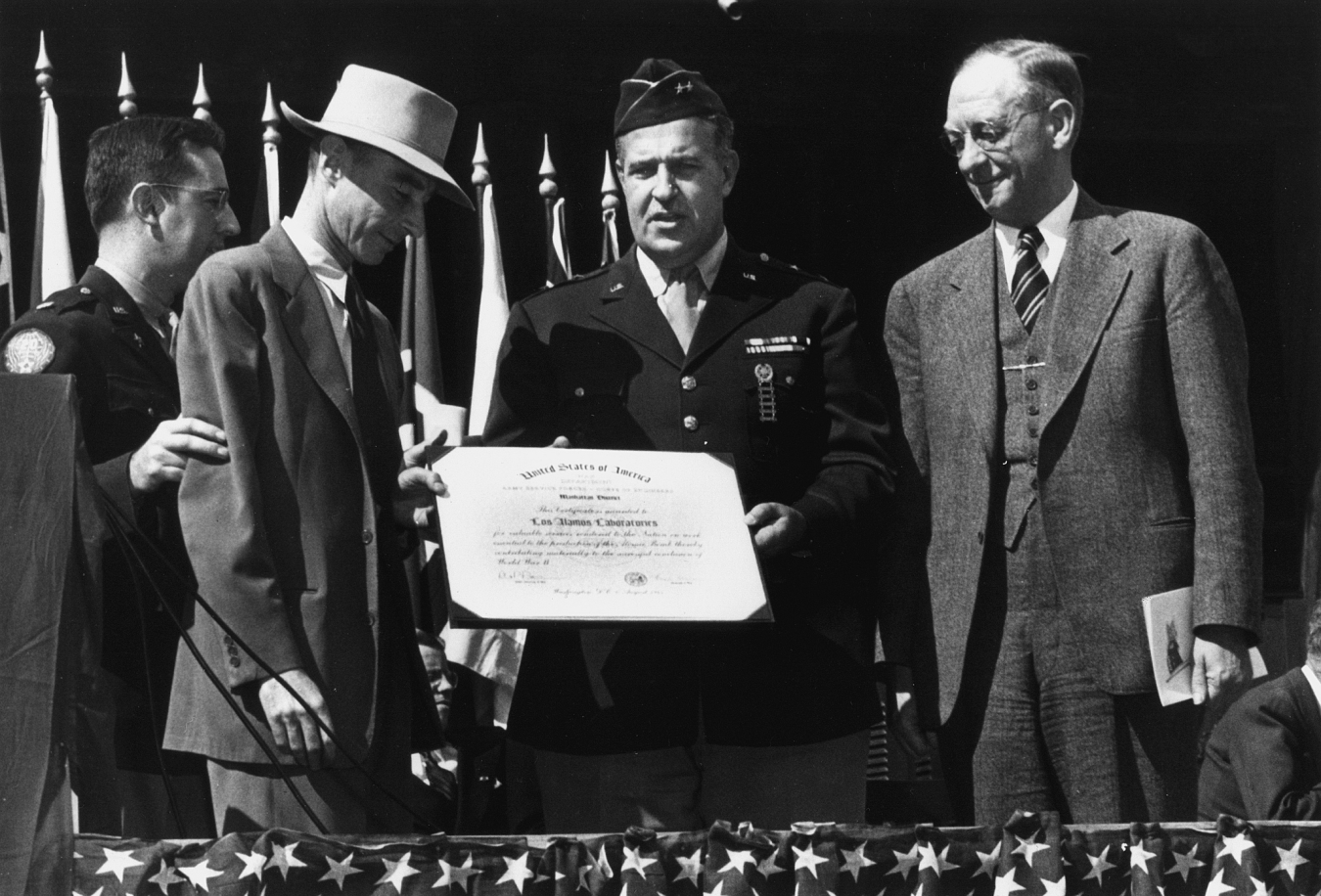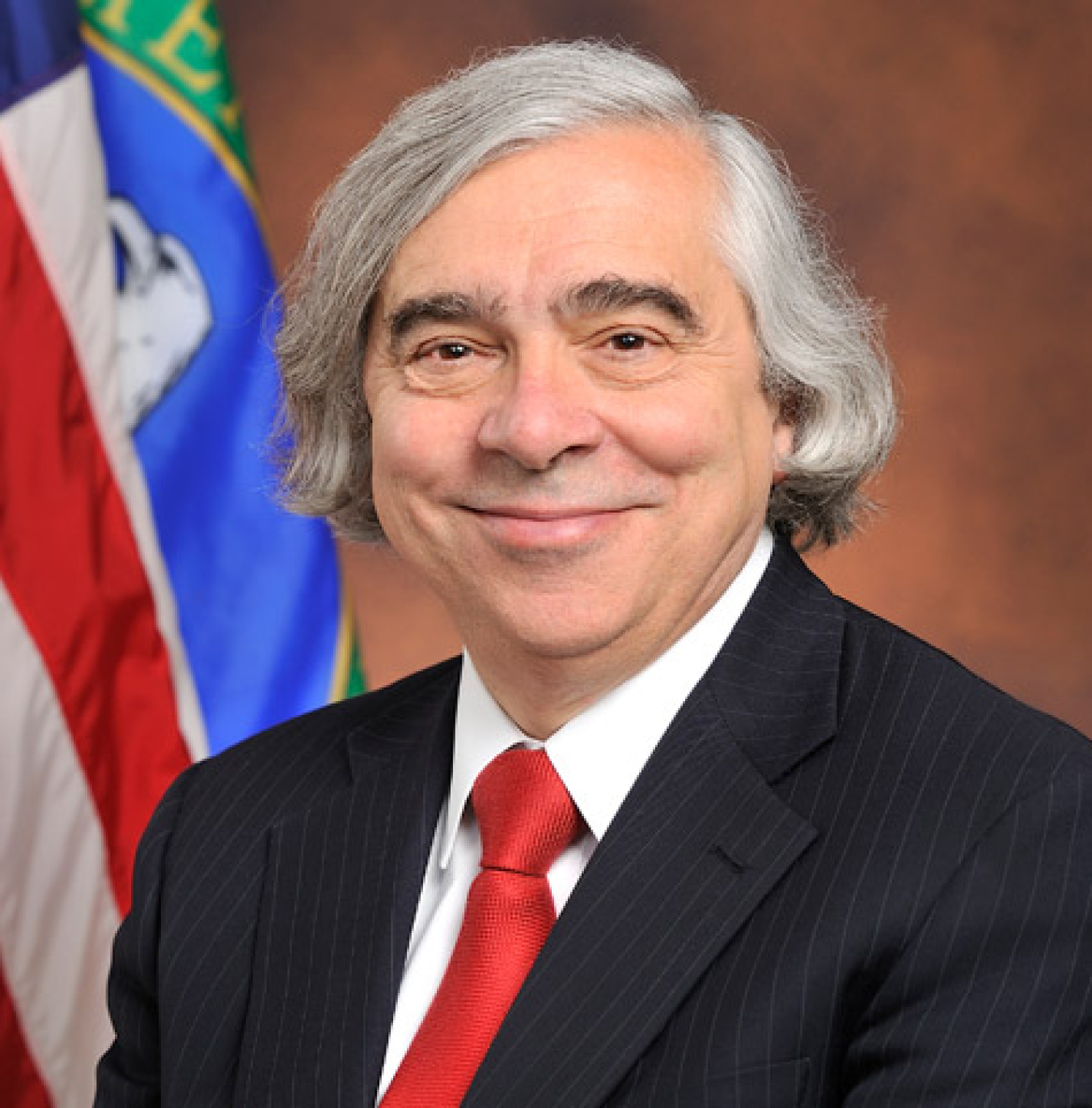The Energy Department's newly expanded and renamed Oppenheimer Science and Energy Leadership Program will pay tribute to J. Robert Oppenheimer’s extraordinary achievements and carry on his legacy of science serving society.
January 18, 2017
Los Alamos National Laboratory presents an award to J. Robert Oppenheimer (second from left) at the end of World War II, c. 1945.
Last year, the Department of Energy (DOE) launched a pilot program, the Energy Sciences Leadership Group, to develop the next generation of leaders in the science and energy fields. DOE has diverse missions spanning basic science, energy, nuclear security and environmental remediation and it draws upon the scientific, technical, and engineering expertise of the national laboratories to address the toughest challenges associated with those missions.
The initiative brings together exceptional early- and mid-career professionals who have the potential to contribute significantly to DOE’s work, whether at DOE or in national labs, academia or industry. These professionals participate in a year-long series of workshops, in Washington D.C. and at national laboratories, covering the spectrum of DOE’s missions and operations. The workshops will help them develop leadership skills, gain a systems-level understanding of the nation’s energy enterprise, meet distinguished leaders and innovators from all aspects of the science and energy field, and gain first-hand exposure to Federal policymaking and the wider scientific ecosystem in which policies are made. The pilot program has fourteen participants and has been judged to be very successful.
In this light, the initiative will be expanded and renamed the Oppenheimer Science and Energy Leadership Program. J. Robert Oppenheimer exemplified the leadership qualities we seek to identify and nurture in this initiative. At the age of thirty-eight, he was put in charge of the Manhattan Project. He identified the site for what is now the Los Alamos National Laboratory and built it by bringing together outstanding scientists and engineers from multiple disciplines and carrying out a complex large-scale mission-directed project. He is rightfully considered a “founding father” of the DOE national laboratory system that remains at the core of DOE’s mission success. The Government-Owned Contractor-Operated (GOCO) management approach introduced for the Manhattan Project continues as the predominant management model for the DOE laboratories.
In making this designation, we fully acknowledge the controversy surrounding Dr. Oppenheimer’s security clearance a decade after the Manhattan Project. The majority of a Personnel Security Board judged in 1954 that he was not blameless for initially failing to report contacts involving a friend who was a Communist sympathizer and voted to revoke his clearance. However, the Board also concluded that “…we find no evidence of disloyalty. Indeed, we have before us much responsible and positive evidence of the loyalty and love of country of the individual concerned.” Since then, the National Security Agency released additional information concerning Soviet espionage efforts, including that related to the Manhattan Project, and the released materials strengthen the conclusion that Oppenheimer was never disloyal. In 2014, DOE released the full un-redacted transcript of the Oppenheimer hearing.
J. Robert Oppenheimer’s extraordinary scientific and management achievements during his own “mid-career” were instrumental for shaping today’s DOE and its national laboratories. Now and into the future, identifying and developing exceptional early- and mid-career scientists and engineers who can materially advance DOE missions is important for America’s energy, economic, environmental and nuclear security. The Oppenheimer Science and Energy Leadership Program participants will carry on his legacy of science serving society.
Dr. Ernest Moniz
Download high-resolution portraits
Dr. Ernest Moniz served as United States Secretary of Energy from May 21, 2013 to January 19, 2017. As Secretary of Energy, he was tasked with implementing critical Department of Energy missions in support of President Obama’s goals of growing the economy, enhancing security and protecting the environment. This encompassed advancing the President’s all-of-the-above energy strategy, maintaining the nuclear deterrent and reducing the nuclear danger, promoting American leadership in science and clean energy technology innovation, cleaning up the legacy of the cold war, and strengthening management and performance.
Prior to his appointment, Dr. Moniz was the Cecil and Ida Green Professor of Physics and Engineering Systems at the Massachusetts Institute of Technology (MIT), where he was a faculty member since 1973. At MIT, he headed the Department of Physics and the Bates Linear Accelerator Center. Most recently, Dr. Moniz served as the founding Director of the MIT Energy Initiative and as Director of the MIT Laboratory for Energy and the Environment where he was a leader of multidisciplinary technology and policy studies on the future of nuclear power, coal, nuclear fuel cycles, natural gas and solar energy in a low-carbon world.
From 1997 until January 2001, Dr. Moniz served as Under Secretary of the Department of Energy. He was responsible for overseeing the Department’s science and energy programs, leading a comprehensive review of nuclear weapons stockpile stewardship, and serving as the Secretary’s special negotiator for the disposition of Russian nuclear materials. From 1995 to 1997, he served as Associate Director for Science in the Office of Science and Technology Policy in the Executive Office of the President.
In addition to his work at MIT, the White House and the Department of Energy, Dr. Moniz has served on a number of boards of directors and commissions involving science, energy and security. These include President Obama’s Council of Advisors on Science and Technology, the Department of Defense Threat Reduction Advisory Committee, and the Blue Ribbon Commission on America’s Nuclear Future.
A member of the Council on Foreign Relations, Dr. Moniz is a Fellow of the American Association for the Advancement of Science, the American Academy of Arts and Sciences, the Humboldt Foundation, and the American Physical Society.
Dr. Moniz received a Bachelor of Science degree summa cum laude in Physics from Boston College, a Doctorate in Theoretical Physics from Stanford University, and honorary degrees from the University of Athens, Boston College, Boston University, the University of Erlangen-Nurenberg, Iowa State University, University of Massachusetts Dartmouth, Michigan State University and Universidad Pontificia de Comillas. He has been awarded the Distinguished Public Service Medal of the Department of Defense, and the Grand Cross of the Order of Prince Henry the Navigator.


